Best HR Software for Healthcare Industry 2025: Complete Platform Comparison Guide
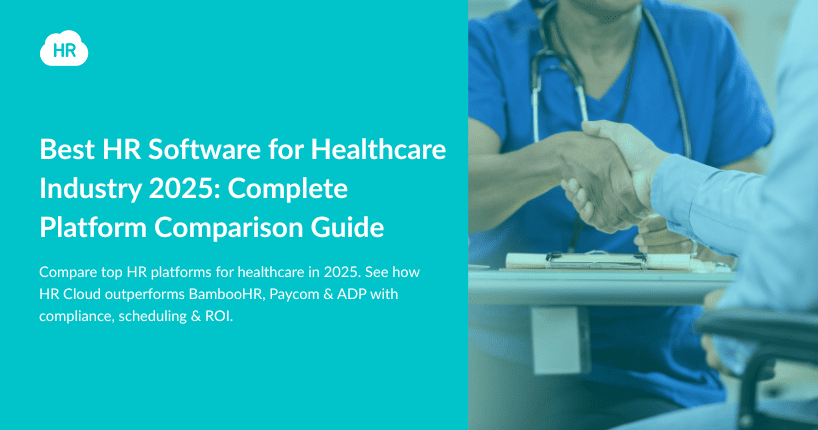
- Healthcare HR Challenges: Why Standard Business Software Fails
- Essential Features for Healthcare HR Software Success
- HR Cloud: Leading Healthcare-Focused Solution Analysis
- Real-World Success: Healthcare Organizations Transform Operations with Specialized HR Technology
- Competitor Analysis: Platform Limitations in Healthcare Environments
- Platform Comparison: Healthcare Suitability Analysis
- Implementation Strategies for Healthcare Organizations
- Cost Analysis and ROI for Healthcare HR Technology
- Future of Healthcare HR Technology: Emerging Trends and Innovations
- Strategic Recommendations for Healthcare Organizations


 Cut onboarding time
by 60%—here's the
Ultimate Checklist
that helped do it.
Cut onboarding time
by 60%—here's the
Ultimate Checklist
that helped do it.

Healthcare organizations face unprecedented workforce management challenges that demand specialized HR software solutions beyond traditional business platforms. With healthcare employment projected to grow 13% through 2031 according to the Bureau of Labor Statistics, medical facilities must implement technology that addresses unique industry requirements, including complex compliance mandates, 24/7 scheduling demands, and critical staff retention needs.
Modern healthcare HR software must handle compliance, medical license tracking, complex shift scheduling, and high turnover rates that generic platforms simply cannot address. This comprehensive analysis examines leading HR platforms specifically through the lens of healthcare operations, revealing how different solutions perform in real medical environments across hospitals, clinics, and medical practices.
Healthcare HR software systems must handle compliance, medical license tracking, complex shift scheduling, and high turnover rates that generic platforms cannot address. HR Cloud leads with specialized healthcare features, including automated credentialing, 24/7 scheduling support, and rapid implementation timelines designed specifically for medical facilities.
Competitors like BambooHR struggle with healthcare-specific needs, while Paycom's complexity creates implementation challenges for hospitals and medical practices. This guide analyzes platform capabilities, pricing, and real-world performance for healthcare organizations seeking optimal HR technology solutions that understand the unique demands of medical environments.
Healthcare HR Challenges: Why Standard Business Software Fails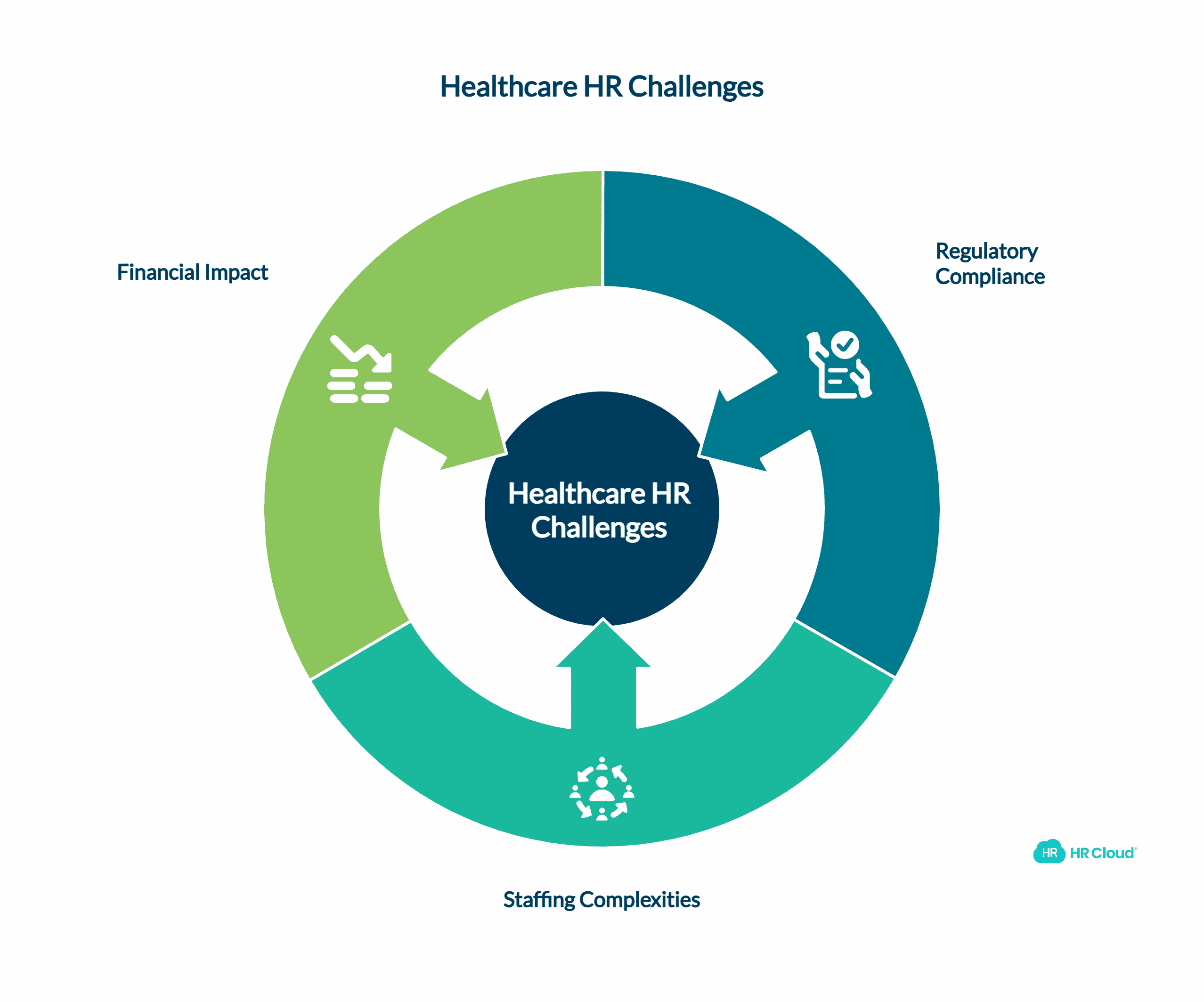
Healthcare organizations operate under regulatory and operational pressures that standard HR platforms simply cannot address effectively. Research from the Society for Human Resource Management demonstrates that healthcare facilities face unique compliance requirements, scheduling complexities, and staff retention challenges that require industry-specific solutions rather than generic business software.
Complex Regulatory Compliance Environment
Healthcare HR departments must navigate an intricate web of federal, state, and local regulations that other industries rarely encounter. HIPAA compliance extends beyond patient records to encompass employee data management, requiring specialized security measures and access controls. The consequences of non-compliance prove severe, with healthcare organizations facing average violation fines of $1.5 million annually, according to Department of Health and Human Services data.
OSHA requirements mandate specific safety training, bloodborne pathogen protocols, and workplace safety documentation that must be tracked continuously. Joint Commission standards add another layer of compliance complexity, requiring detailed credentialing processes, ongoing competency assessments, and comprehensive audit trails. Generic HR software lacks the specialized tracking capabilities needed to manage these overlapping regulatory requirements effectively.
Medical licensing and certification requirements vary by state and specialty, creating ongoing administrative burdens for healthcare HR teams. Traditional HR platforms cannot automate license renewal tracking, continuing education requirements, or specialty certification management, which are essential for maintaining operational compliance and avoiding service disruptions.
Unique Staffing and Operational Complexities
Healthcare facilities require 24/7 staffing coverage with complex skill-based assignments that traditional HR systems cannot manage effectively. Float pool coordination across departments, emergency staffing protocols, and on-call management require sophisticated scheduling capabilities beyond basic time tracking features.
Multiple employee classifications, including full-time staff, part-time workers, travel nurses, contractors, and temporary personnel, create payroll and compliance complexities that generic platforms handle poorly. Each classification may have different overtime rules, benefit eligibility, and reporting requirements that require specialized configuration and tracking capabilities.
Patient acuity fluctuations drive unpredictable staffing needs that require rapid response capabilities and flexible scheduling systems. When patient census increases unexpectedly, healthcare facilities must quickly identify available qualified staff and adjust schedules while maintaining appropriate nurse-to-patient ratios and specialty coverage requirements.
Financial Impact of Inefficient HR Processes
Healthcare organizations face significant financial pressures that make efficient HR operations critical for sustainability. Industry data shows that labor costs represent 50-60% of hospital operating expenses, emphasizing the need for HR technology that demonstrably improves cost management and operational efficiency.
High turnover rates create substantial hidden costs, including recruitment expenses, training investments, overtime payments for coverage, and potential impacts on patient satisfaction scores. When experienced nurses leave, remaining staff often work additional hours at premium rates while new employees require extensive orientation and mentoring support.
Compliance violations result in direct financial penalties and potential restrictions on operations or reimbursements. Medicare and Medicaid reimbursement rates increasingly tie to quality metrics and patient satisfaction scores, making efficient staffing and employee engagement essential for financial performance.
Ready to address your healthcare organization's unique HR challenges? Schedule a specialized healthcare demo to see how purpose-built solutions can transform your operations.
Essential Features for Healthcare HR Software Success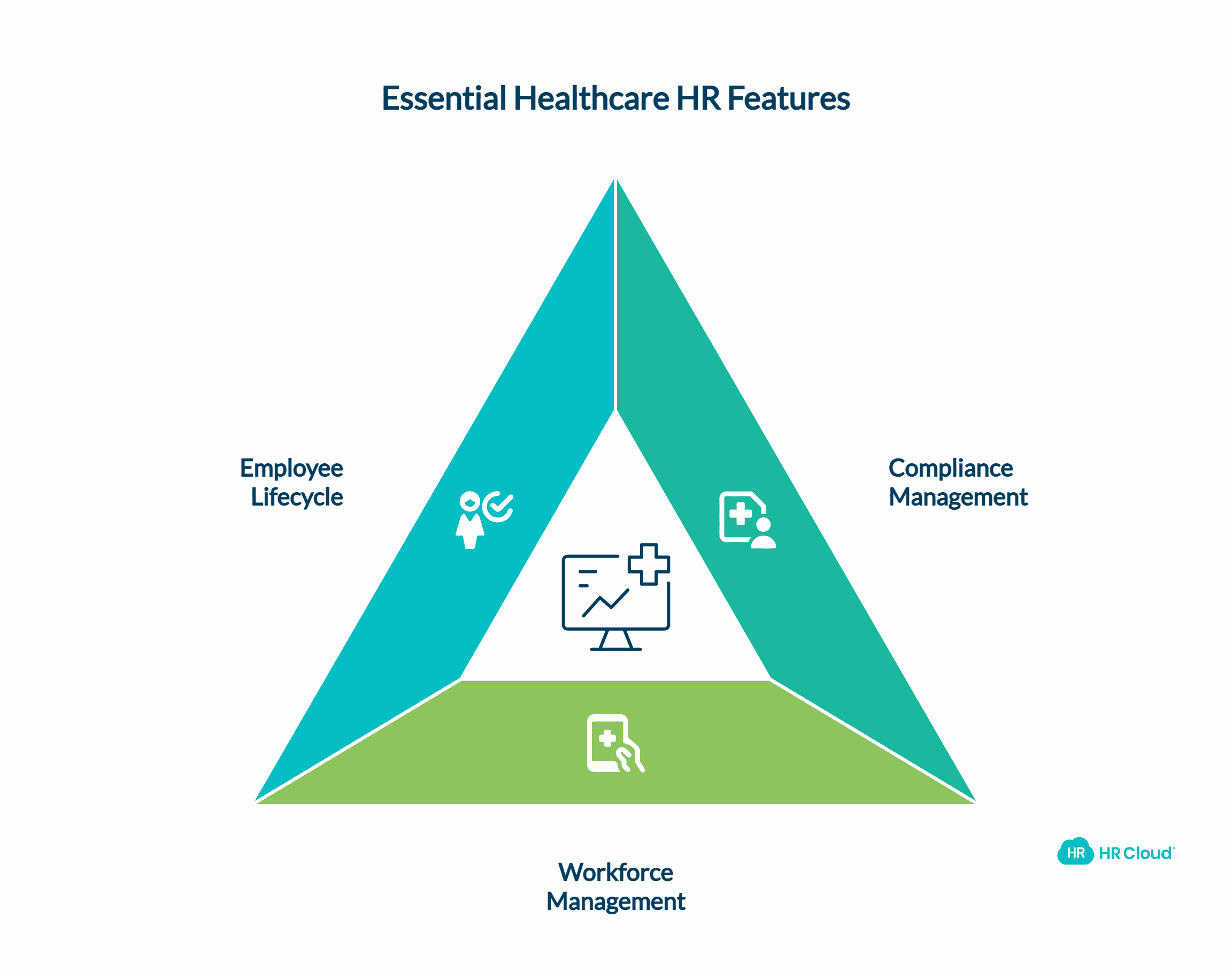
Healthcare organizations require HR platforms with specialized capabilities that address industry-specific operational demands while maintaining the flexibility to adapt to evolving regulatory requirements. These essential features distinguish effective healthcare HR solutions from generic business platforms that lack the depth needed for medical environments.
Comprehensive Compliance Management and Documentation
Medical license and certification tracking capabilities must include automated renewal reminders, integration with state medical boards for real-time verification, and comprehensive reporting for credentialing committees. The system should track continuing education credits, specialty certifications, DEA registrations, and facility-specific training requirements with automated alerts and escalation protocols.
Regulatory training documentation requires sophisticated tracking for HIPAA privacy and security training, OSHA bloodborne pathogen protocols, emergency preparedness procedures, and Joint Commission requirements. The platform must maintain detailed records of training completion dates, renewal schedules, and competency assessments while generating compliance reports for regulatory inspections.
Background check and drug screening management must accommodate healthcare-specific requirements, including criminal background verification, employment history validation, and ongoing monitoring for certain positions. The system should integrate with credentialing services and background check providers while maintaining detailed audit trails for compliance documentation.
Advanced Scheduling and Workforce Management
Complex shift support capabilities must accommodate 12-hour patterns, rotating schedules, weekend and holiday differentials, and multiple time zones for health systems with distributed locations. Automated overtime calculations should handle healthcare-specific rules, including consecutive shift limitations, meal break requirements, and call pay calculations.
Float pool and resource management features enable cross-departmental scheduling based on patient census, skill-based matching for specialized units, and emergency staffing protocols with automated notification systems. The platform should support skills matrices that identify qualified staff for ICU, emergency department, surgical, and specialty care assignments.
Integration with nurse staffing agencies and travel companies streamlines temporary workforce management while maintaining compliance with agency contracts and credentialing requirements. The system should track agency rates, assignment durations, and performance metrics while ensuring all temporary staff meet facility requirements.
Healthcare-Specific Employee Lifecycle Management
Credentialing and background verification processes must integrate with databases like the National Practitioner Data Bank, state medical boards, and specialty certification organizations. Automated workflows should guide new hires through medical staff bylaws requirements, peer review processes, and hospital privileges applications.
Performance management for clinical roles requires competency assessments, quality metrics integration from EMR systems, patient satisfaction correlation analysis, and clinical ladder progression tracking. The platform should support ongoing competency validation and professional development planning specific to healthcare roles.
Employee health and safety monitoring capabilities must track immunization records, annual health screenings, fit testing for respiratory protection, and exposure incident documentation. Integration with occupational health services and employee health clinics streamlines ongoing health monitoring requirements.
HR Cloud: Leading Healthcare-Focused Solution Analysis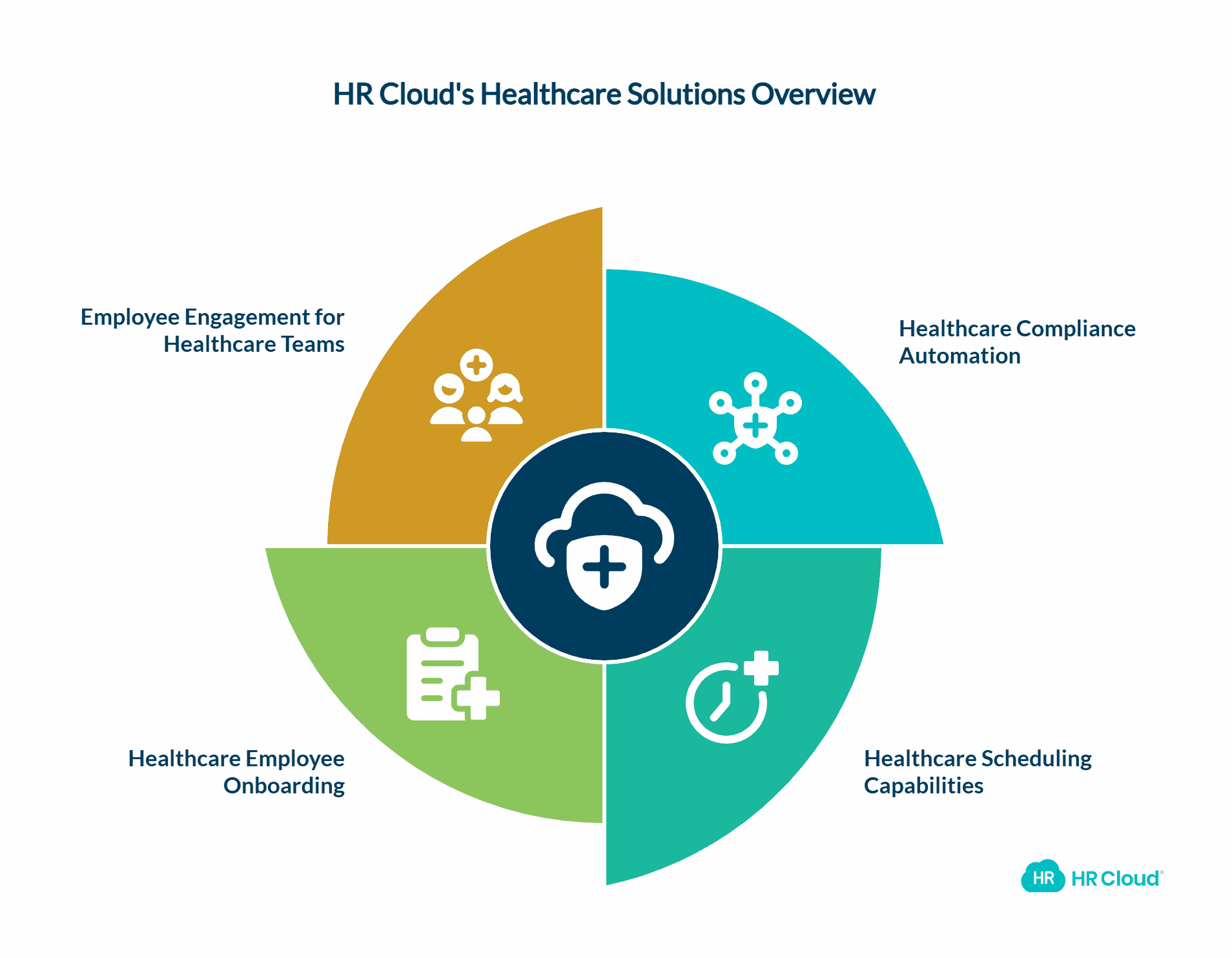
HR Cloud emerges as the most comprehensive platform for healthcare organizations, offering specialized features designed specifically for medical environments while maintaining the flexibility to adapt to diverse healthcare settings. The platform's healthcare-specific capabilities address critical operational needs that generic HR software cannot handle effectively.
Comprehensive Healthcare Compliance Automation
HR Cloud's I-9 and E-Verify processing includes healthcare-specific verification workflows that accommodate medical licensure requirements and specialty certifications. The system integrates with state medical boards and certification organizations to provide real-time license verification and automated renewal tracking that prevents compliance gaps.
HIPAA compliance features include role-based access controls, encrypted data storage, and comprehensive audit trails that meet healthcare privacy requirements. The platform maintains detailed logs of all system access and data modifications, providing documentation necessary for regulatory inspections and compliance audits.
Medical credentialing workflows automate the complex process of physician and nurse practitioner privilege applications, peer review coordination, and ongoing competency assessments. The system tracks medical education verification, malpractice insurance, and professional references while generating reports for medical staff committees.
Sophisticated Healthcare Scheduling Capabilities
Advanced time tracking features support complex healthcare shift patterns, including 12-hour rotations, call schedules, and premium pay calculations for holidays and weekends. The system handles multiple employee classifications with different overtime rules and benefit eligibility requirements.
Float pool management capabilities enable skills-based assignments across departments while maintaining appropriate staffing ratios and specialty coverage. The platform identifies qualified staff for emergency assignments and automates notification processes for urgent staffing needs.
Integration with patient census systems and EMR platforms provides real-time data for staffing decisions based on patient acuity and care requirements. The system can automatically adjust staffing recommendations based on predictive analytics and historical patterns.
Streamlined Healthcare Employee Onboarding
Rapid onboarding workflows accommodate urgent staffing needs common in healthcare environments while ensuring comprehensive orientation and training completion. The system supports digital completion of medical forms, emergency contact information, and healthcare-specific acknowledgments.
Credentialing integration enables new hires to complete background checks, license verification, and health screening requirements through streamlined digital workflows. The platform coordinates with multiple third-party providers while maintaining visibility into completion status and potential delays.
Department-specific orientation modules ensure that new employees receive appropriate training for their assigned units while tracking competency requirements and certification needs. The system maintains records of orientation completion and ongoing training requirements throughout the employment lifecycle.
Enhanced Employee Engagement for Healthcare Teams
The Workmates platform facilitates communication across shifts and departments, addressing the challenge of maintaining team cohesion in 24/7 healthcare environments. The social intranet features enable information sharing, recognition programs, and informal collaboration that strengthen workplace culture.
Shift-specific communication tools enable incoming staff to receive updates from departing shifts, access important patient care information, and coordinate with team members across different schedules. The platform maintains communication history and ensures critical information reaches appropriate personnel.
Recognition programs tailored for healthcare environments celebrate patient care achievements, safety milestones, and professional development accomplishments. The system enables peer-to-peer recognition and formal acknowledgment processes that reinforce positive behaviors and organizational values.
Discover how HR Cloud's healthcare-specific features can transform your medical facility's operations. Request a healthcare-focused consultation to explore platform capabilities designed for your industry.
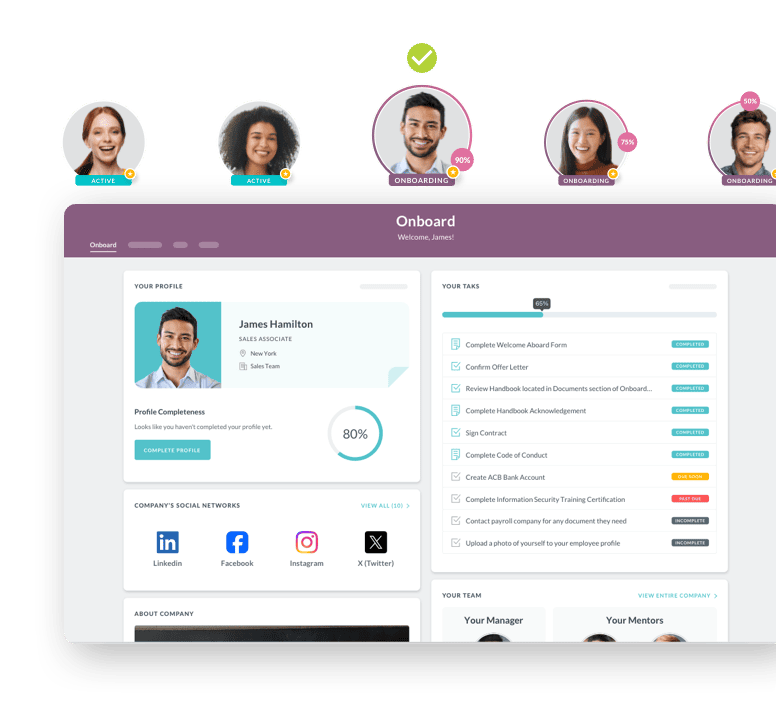
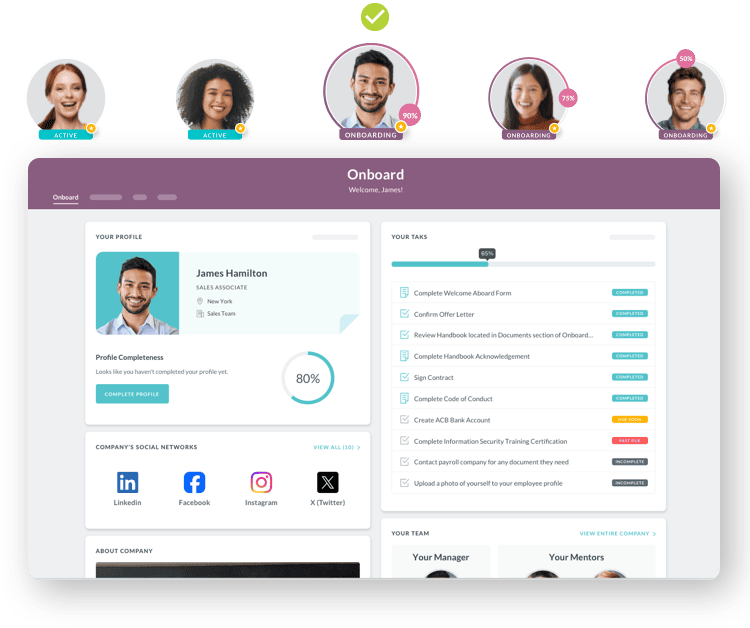
Real-World Success: Healthcare Organizations Transform Operations with Specialized HR Technology
Healthcare providers across the country are discovering that industry-specific HR platforms deliver measurable results that generic business software simply cannot achieve. These authentic case studies demonstrate how purpose-built solutions address the unique challenges facing medical organizations while delivering quantifiable improvements in efficiency, compliance, and cost management.
Case Study: Renaissance Outpatient Rehabilitation Center - 50% Onboarding Time Reduction
Renaissance Outpatient Rehabilitation Center, a 50-employee physical therapy provider across five locations, faced critical operational bottlenecks that threatened aggressive growth plans. CEO Travis French recognized that manual processes were creating compliance risks while preventing qualified therapists from serving patients quickly.
The Challenge: Paper-Based Chaos Threatening Growth
"Our old approach was completely paper-based," French explains. "On one hand, it took too long to onboard employees, but it also subjected us to too much compliance risk—and potentially expensive fines."
With Renaissance implementing growth strategies that could double revenues and headcount, the manual onboarding system became unsustainable. Each new hire required extensive paperwork coordination across multiple locations, creating delays that impacted patient care capacity and operational efficiency.
The Solution: Rapid Digital Transformation
Renaissance selected HR Cloud's Onboard platform based on its healthcare-specific compliance features and rapid implementation timeline. The transition from paper-based processes to automated workflows proved transformative for their operations.
Measurable Results:
-
Cut onboarding time in half across all locations
-
Saved the equivalent of two HR manager positions
-
Achieved $75,000 annual cost savings
-
Eliminated compliance risks through automated tracking
-
Enabled focus on core business growth and patient care
"With HR Cloud, I've been able to cut our onboarding time in half and save the equivalent of two HR manager positions," French reports. "This alone has helped us save nearly $75,000 per year, which really helps our bottom line."
The automated compliance management gave Renaissance "true peace of mind" while supporting their expansion into new markets and service lines. The time savings allowed management to focus on strategic initiatives rather than administrative tasks.
Case Study: Medlinks Cost Containment - Healthcare Staffing Excellence at Scale
Medlinks Cost Containment, founded in 1997, provides medical billing, auditing, coding, and staffing services to healthcare institutions nationwide. As demand for their specialized services grew, Operations Administrator Shirley Garcia faced mounting pressure to scale recruiting and onboarding for hundreds of seasonal healthcare workers.
The Challenge: Scaling Healthcare Workforce Services
"Our entire process was completely paper-based," Garcia recalls. "It just didn't give us an effective way to manage our recruiting process or give us visibility into how many applicants were in each phase of our pipeline. Our projects were growing much bigger each year."
The manual system prevented Medlinks from meeting client expectations for rapid healthcare staffing deployment, particularly during peak seasons when medical facilities needed immediate workforce support. Without real-time visibility into their recruiting pipeline, they struggled to provide clients with accurate staffing projections.
The Solution: Comprehensive Workforce Management
Medlinks implemented HR Cloud's Recruit ATS and Onboard solutions to automate their entire hiring workflow for healthcare positions. The platform enabled real-time tracking of candidates through each stage while maintaining compliance with healthcare industry requirements.
Transformation Results:
-
Streamlined recruiting pipeline with complete visibility
-
Automated onboarding workflows for healthcare staff
-
Real-time workforce statistics for client reporting
-
Enhanced project communication capabilities
-
Demonstrated capacity for increased workload
"The process is now so easy and effective," Garcia explains. "Our CEO has even let me know that he's extremely impressed with what we've been able to accomplish with HR Cloud's recruiting, onboarding, offboarding, and project staff communication solutions."
The system now provides detailed reporting that healthcare clients demand: "Our clients want to know details such as how many associates we've found, how many are scheduled to be interviewed, how many have been hired, how many are in test mode, and how many are ready to be presented for approval."
Customer Service Excellence in Healthcare:
Garcia particularly values HR Cloud's responsive support, which proves critical when serving healthcare facilities with urgent staffing needs: "I am so impressed with HR Cloud's response times, which is one of the main reasons why I think they are so successful. I never felt that I was on my own or had to try to figure something out since the HR Cloud team was always there to support me."
Key Success Factors for Healthcare HR Technology Implementation
Both case studies reveal common patterns that contribute to successful healthcare HR technology adoption:
Rapid Implementation: Healthcare organizations require fast deployment to avoid operational disruption. Renaissance and Medlinks both achieved results within weeks rather than months.
Industry-Specific Features: Generic HR platforms lack the compliance tracking, certification management, and reporting capabilities that healthcare organizations require for effective operations.
Measurable ROI: Both organizations achieved quantifiable results, including cost savings, time reduction, and improved operational capacity, that justify technology investments.
Scalability Support: The platforms enabled both organizations to handle growth without proportional increases in administrative burden or compliance risks.
Responsive Support: Healthcare environments require technical support that understands medical industry requirements and can respond quickly to operational needs.
Competitor Analysis: Platform Limitations in Healthcare Environments
Healthcare organizations evaluating HR software options must understand how different platforms perform in medical environments, where generic business features often prove inadequate for industry-specific requirements. This analysis examines major competitors through the lens of healthcare operations, revealing significant gaps in functionality and support.
BambooHR: Insufficient Healthcare Capabilities
While BambooHR offers clean interfaces and basic HR functionality, healthcare organizations consistently encounter limitations that impact operational effectiveness and compliance management. The platform's design for general business use creates significant gaps when applied to healthcare environments.
Acknowledged Basic Strengths:
-
Intuitive user interface for standard HR tasks
-
Employee database management with custom fields
-
Basic time-off tracking and approval workflows
-
Standard onboarding checklists and document management
Critical Healthcare Limitations: Healthcare organizations report numerous challenges when attempting to use BambooHR for medical facility operations. User reviews consistently highlight "lots of bugs in BambooHR" and fundamental limitations that affect healthcare-specific workflows. The platform lacks medical license tracking capabilities, HIPAA compliance features, and complex scheduling tools required for 24/7 operations.
Compliance gaps represent the most significant concern for healthcare users. The system cannot track medical certifications, continuing education requirements, or specialty licenses that are essential for healthcare operations. Background check integration lacks healthcare-specific features like National Practitioner Data Bank queries and medical board verifications.
Scheduling limitations prove particularly problematic for healthcare environments. Reviews specifically note that the platform "doesn't work well in a clinical field when clinicians work 10-hour days for 4 days or sometimes 6 hours 1 day and 12 hours another day." The system cannot handle float pool management, on-call scheduling, or emergency staffing protocols required in medical facilities.
Multi-location support creates additional challenges for health systems. Users report "no support when it comes to the fact we have employees in multiple states," which is critical for healthcare organizations with facilities across different jurisdictions with varying regulations and licensing requirements.
Customer service quality has declined as the company has grown, with users experiencing delayed responses and limited healthcare expertise among support staff. Healthcare organizations require specialized technical support that understands medical industry requirements and compliance obligations.
Healthcare Verdict: BambooHR may suffice for small medical practices with basic administrative needs, but lacks the specialized features required for effective healthcare operations. The platform's limitations become more pronounced as organizations grow or face complex regulatory requirements.
Paycom: Implementation Complexity and Healthcare Gaps
Paycom positions itself as a comprehensive solution, but healthcare organizations frequently struggle with implementation complexity and ongoing operational challenges that limit effectiveness in medical environments.
Acknowledged Strengths:
-
Single database architecture reduces data inconsistencies
-
Comprehensive payroll processing with complex calculations
-
Employee self-service capabilities across mobile devices
-
Automated tax filing and compliance for standard business requirements
Significant Healthcare Implementation Concerns: Healthcare organizations report substantial difficulties with Paycom implementation processes that can disrupt critical medical operations. Users describe being "very frustrated with our implementation" and experiencing pressure to "go live in a very short amount of time" without adequate setup verification for healthcare-specific requirements.
The implementation team often does "a terrible job of working to make sure the setup was right" before deployment, creating ongoing operational problems that are particularly problematic in healthcare environments where system failures can impact patient care. Healthcare organizations require more careful implementation planning and testing than standard business environments.
Premium pricing structure places Paycom 30-50% higher than comparable platforms without commensurate value for healthcare-specific features. This cost differential proves difficult to justify when the platform lacks specialized medical industry capabilities that organizations require for effective operations.
Healthcare-specific limitations include inadequate support for medical licensing, certification tracking, and complex clinical scheduling requirements. The platform's "all-in" approach may conflict with existing hospital systems and EMR platforms that healthcare organizations cannot easily replace.
Integration challenges create additional problems for healthcare environments that rely on specialized medical software. The platform's emphasis on comprehensive solutions may not accommodate the diverse technology ecosystems common in healthcare facilities.
User experience issues affect healthcare workers who require intuitive, accessible systems during patient care responsibilities. Reports of "glitchy" mobile applications and "over the top" security features that are "hard for some tech-challenged staff" create barriers to adoption in healthcare environments.
Healthcare Verdict: While Paycom offers robust payroll functionality, the implementation complexity, premium pricing, and limited healthcare-specific features make it challenging to justify for most medical organizations. The platform may suit large health systems with extensive IT resources, but proves overwhelming for typical healthcare facilities.
ADP Healthcare Solutions: Enterprise Focus with SMB Limitations
ADP provides healthcare-specific modules but primarily targets large hospital systems, often leaving mid-size practices and smaller healthcare facilities underserved with complex, expensive solutions that exceed their operational requirements.
Acknowledged Enterprise Strengths:
-
Established compliance frameworks for large healthcare systems
-
Robust payroll processing with healthcare-specific calculations
-
Integration capabilities with major EMR systems and hospital platforms
-
Comprehensive reporting and analytics for enterprise environments
Limitations for Healthcare Organizations: High cost barriers exclude many mid-size healthcare practices and smaller medical facilities that cannot justify enterprise-level pricing for basic HR functionality. The platform's focus on large health systems creates feature complexity that overwhelms smaller organizations while increasing implementation and maintenance costs.
Complex implementation processes often require 6-12 months for full deployment, creating extended periods of operational uncertainty that healthcare organizations cannot afford. During implementation, facilities must maintain existing systems while transitioning to new processes, creating additional administrative burden and potential compliance risks.
Limited customization options may not accommodate the diverse operational requirements of different healthcare specialties and facility types. The standardized approach that works for large hospital systems may not fit the unique needs of specialty practices, outpatient clinics, or rehabilitation facilities.
Support challenges result from the large customer base and complex platform requirements. Healthcare organizations may experience slower response times and limited access to specialized support staff who understand medical industry requirements and regulatory obligations.
Healthcare Verdict: ADP Healthcare Solutions work well for large health systems with dedicated IT resources and complex operational requirements. However, the platform's enterprise focus, high costs, and implementation complexity make it impractical for most mid-size healthcare practices and smaller medical facilities.
Specialized Healthcare Platforms: Limited Scale and Integration
Several niche platforms focus specifically on healthcare but often lack the scalability, integration capabilities, and comprehensive features that growing medical organizations require for long-term success.
HR for Health: Medical Practice Focus with Constraints. This platform targets small medical and dental practices with healthcare-specific features, but faces limitations in scalability and integration capabilities that restrict growth potential.
Strengths:
-
Healthcare-specific compliance focus with medical industry expertise
-
Specialized consulting services and implementation support
-
Medical and dental practice workflow optimization
Limitations:
-
Limited scalability for organizations exceeding 100 employees
-
Fewer integration options with hospital systems and EMR platforms
-
Higher per-employee costs compared to comprehensive platforms
-
Restricted feature development compared to larger platform providers
Platform Comparison: Healthcare Suitability Analysis
|
Platform |
Healthcare Suitability |
Implementation Timeline |
Key Healthcare Strengths |
Critical Healthcare Limitations |
|
HR Cloud |
Excellent |
2-4 weeks |
Automated onboarding workflows, credential & document tracking, SOC 2 Type II security, audit trails, role-based access controls, mobile-first access, payroll & HRIS integrations |
Non-significant for healthcare |
|
BambooHR |
Poor |
4-8 weeks |
Basic employee database, simple time-off tracking |
No healthcare compliance features, limited scheduling, multi-state gaps |
|
Paycom |
Fair |
6-12 weeks |
Comprehensive payroll, single database |
Complex implementation, premium pricing, limited healthcare focus |
|
ADP Healthcare |
Good |
6-12 months |
Enterprise compliance, EMR integration |
High costs, complex deployment, enterprise-only focus |
|
HR for Health |
Fair |
3-6 weeks |
Healthcare specialization, compliance focus |
Limited scalability, fewer integrations, higher per-employee costs |
Transform your healthcare HR operations with specialized technology designed for medical environments. Schedule a healthcare industry consultation to explore platform options tailored to your facility's requirements.
Implementation Strategies for Healthcare Organizations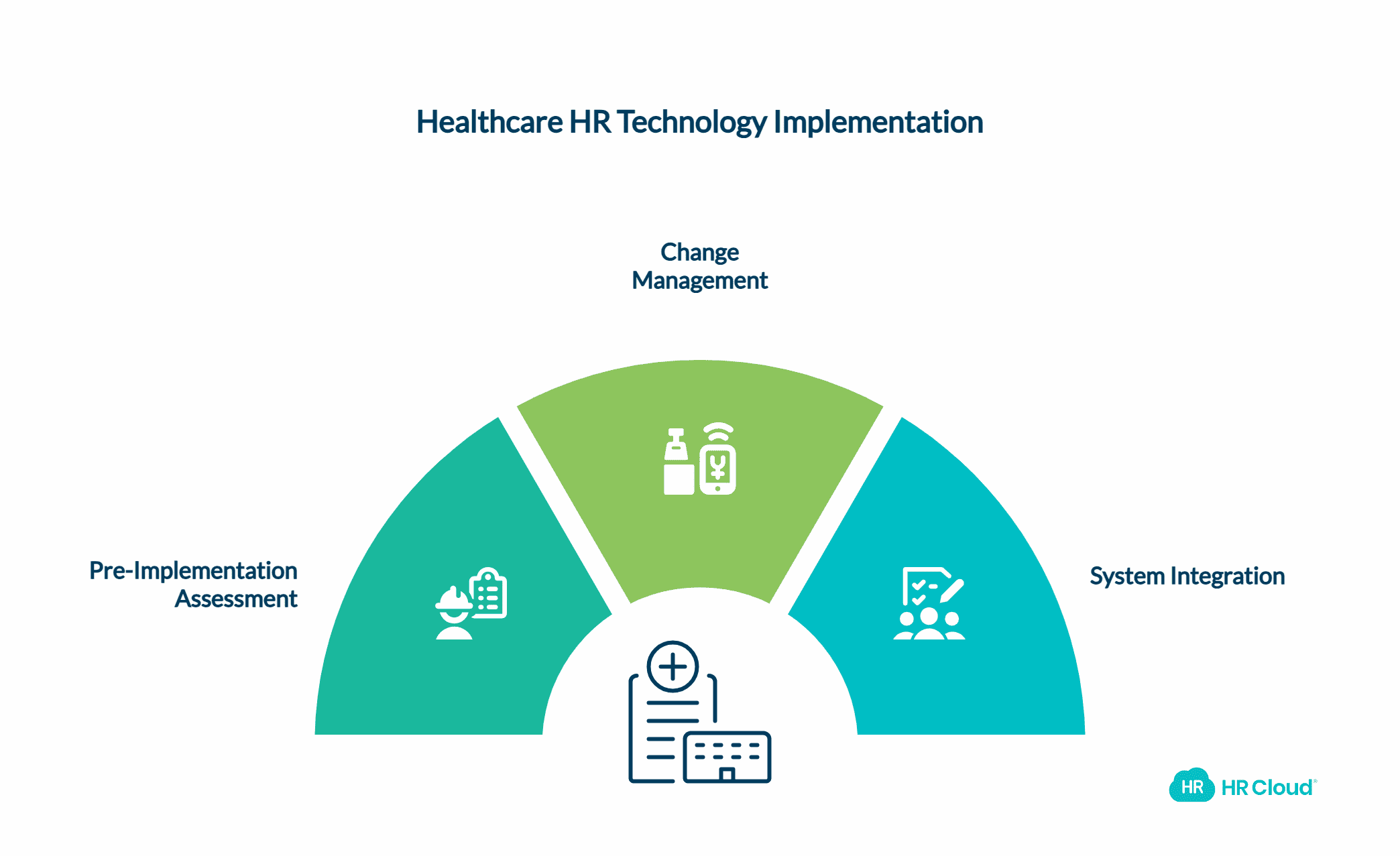
Successful HR technology deployment in healthcare environments requires careful planning that addresses operational continuity, staff training, and compliance requirements while minimizing disruption to patient care operations. Healthcare-specific implementation strategies differ significantly from standard business deployments due to 24/7 operations and critical service requirements.
Pre-Implementation Assessment and Planning
Healthcare organizations must conduct a comprehensive workflow analysis that examines current processes, identifies inefficiencies, and maps integration requirements with existing medical systems. This assessment should include credentialing workflows, scheduling patterns, compliance documentation, and reporting requirements specific to healthcare operations.
Stakeholder engagement requires involvement from clinical leadership, medical staff committees, nursing management, and departmental supervisors who understand operational requirements and workflow implications. Early engagement helps identify potential challenges and establishes champions who can support adoption efforts across different shifts and departments.
Data migration planning proves particularly complex in healthcare environments due to sensitive employee information, medical credentials, and compliance documentation that must be transferred securely and accurately. The process should include validation procedures for medical licenses, certifications, and training records that are critical for ongoing operations.
Change Management for Healthcare Teams
Communication strategies must address concerns about technology changes while emphasizing improvements to daily workflows and patient care support. Healthcare workers often have limited time for training due to patient care responsibilities, requiring flexible training approaches that accommodate shift schedules and clinical demands.
Phased rollout approaches enable healthcare organizations to validate system performance and user acceptance before full deployment across all departments and shifts. This strategy reduces operational risks while providing opportunities to refine processes based on initial user feedback and operational experience.
Training programs should focus on practical applications rather than technical features, demonstrating how the new system improves efficiency and supports patient care objectives. Role-specific training ensures that different healthcare positions receive appropriate instruction for their particular responsibilities and system access requirements.
Integration with Healthcare Systems
EMR integration requires careful coordination with existing clinical systems to ensure seamless data flow and maintain accuracy in employee scheduling, credential tracking, and performance management. The integration should support real-time updates and maintain consistency between HR and clinical systems.
Hospital management system connections enable automated census updates, patient acuity information, and resource allocation data that support intelligent staffing decisions. These integrations provide the data foundation for predictive scheduling and proactive workforce management.
Credentialing database integration streamlines verification processes and maintains current information for medical licenses, certifications, and professional credentials. Automated updates reduce administrative burden while ensuring compliance with medical staff bylaws and regulatory requirements.
Cost Analysis and ROI for Healthcare HR Technology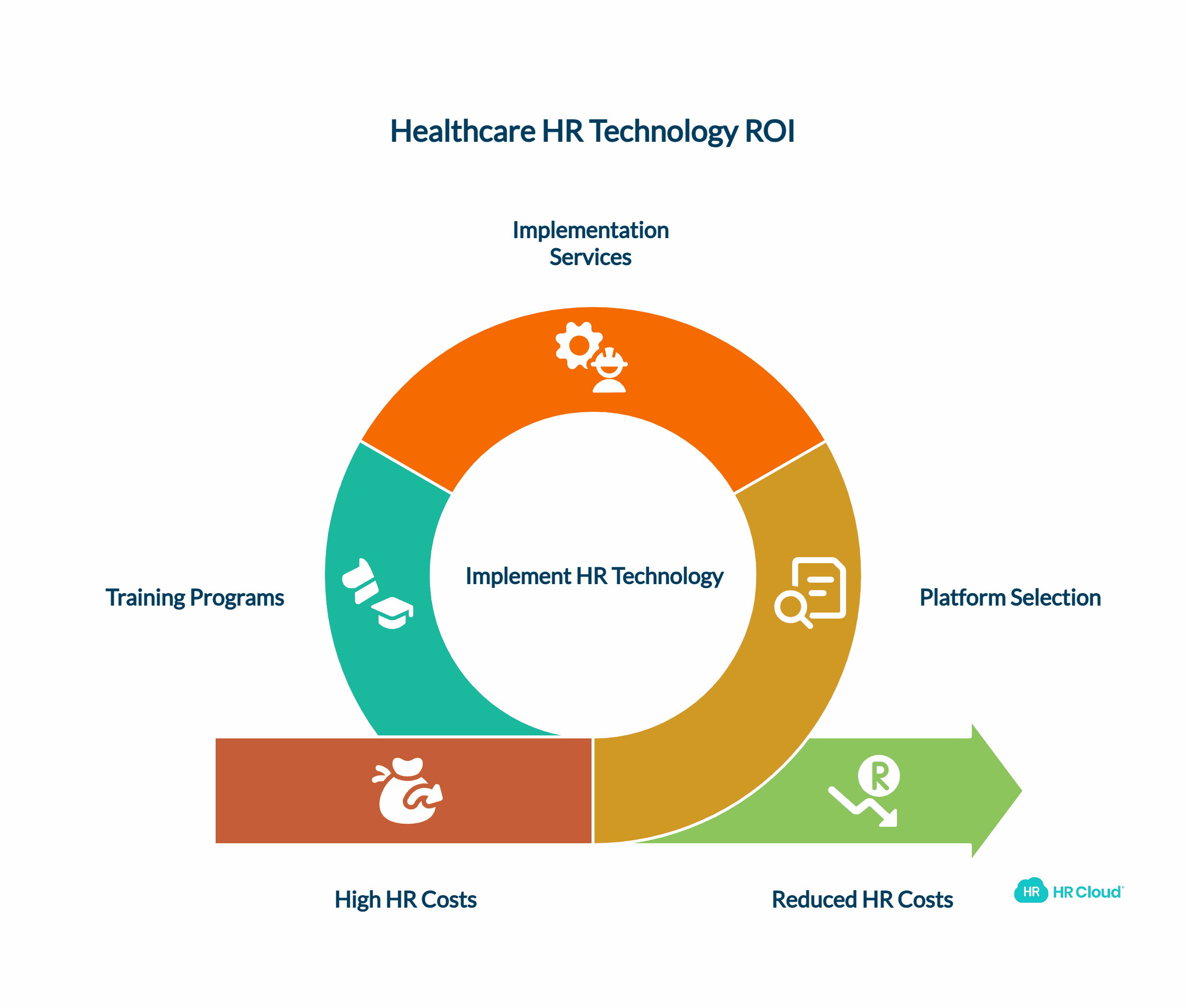
Healthcare organizations face unique financial pressures that make ROI calculation critical for HR technology investment decisions. Understanding both direct costs and indirect benefits helps justify investments while ensuring optimal platform selection for long-term sustainability.
Direct Implementation and Operational Costs
Platform licensing costs vary significantly between healthcare-focused solutions and generic business platforms. HR Cloud's healthcare-specific features often provide better value than enterprise platforms that require extensive customization to accommodate medical industry requirements.
Implementation services for healthcare environments typically cost more than standard business deployments due to complex integration requirements, specialized configuration needs, and extended testing periods required for medical operations. However, faster implementation timelines of 2-4 weeks versus 6-12 months for enterprise solutions reduce overall project costs and enable faster benefit realization.
Training expenses depend on platform complexity and healthcare-specific features. Intuitive platforms designed for healthcare environments require less training time and reduce change management costs compared to complex enterprise systems that require extensive user education.
Quantifiable Healthcare Benefits
Compliance cost avoidance represents significant value for healthcare organizations. HIPAA violation prevention saves an average of $1.5 million annually, while automated tracking systems reduce the risk of regulatory penalties and operational disruptions.
Administrative efficiency gains enable healthcare HR teams to focus on strategic initiatives rather than routine tasks. Time savings of 60-80% for administrative functions translate directly to cost reductions and improved staff productivity through streamlined onboarding processes.
Improved retention rates provide substantial financial benefits, given the high cost of healthcare worker replacement. Reducing nurse turnover by even 10% can save hundreds of thousands of dollars annually in recruitment, training, and temporary staffing costs. Employee engagement platforms help address burnout and satisfaction issues that drive turnover.
Enhanced scheduling efficiency reduces overtime expenses and improves staff satisfaction through better work-life balance. Automated scheduling optimization can reduce overtime costs by 20-25% while maintaining appropriate staffing levels and patient care standards.
Future of Healthcare HR Technology: Emerging Trends and Innovations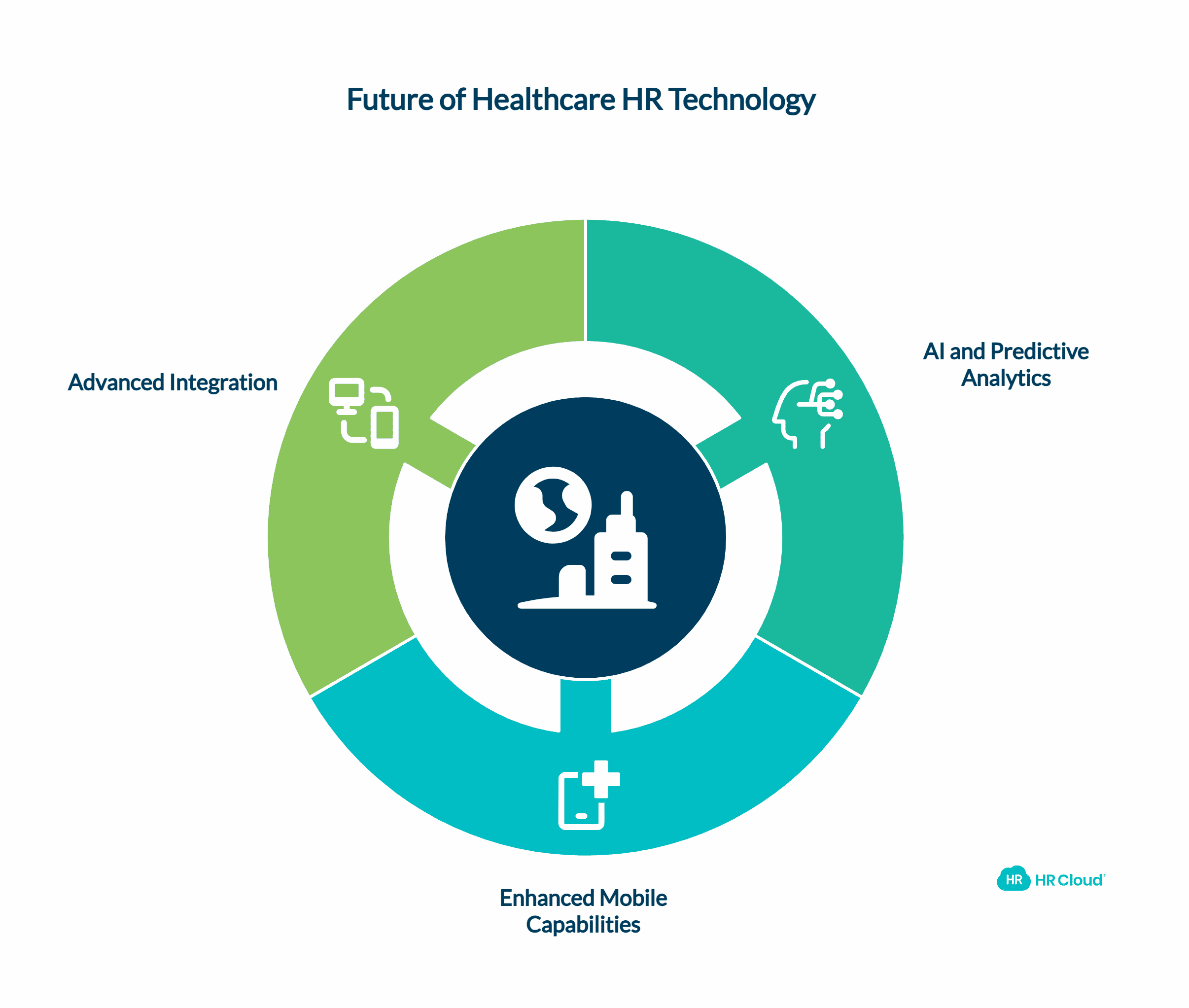
Healthcare HR technology continues evolving to address emerging workforce challenges while incorporating new technologies that enhance platform capabilities. Understanding development trends helps healthcare organizations make informed decisions about long-term technology investments.
Artificial Intelligence and Predictive Analytics
AI-powered scheduling optimization will analyze patient census patterns, staff preferences, and historical data to create more efficient schedules while reducing overtime costs and improving work-life balance. Machine learning algorithms will identify patterns that human schedulers might miss, leading to better resource allocation and staff satisfaction.
Predictive analytics for staff turnover will help healthcare organizations identify employees at risk of leaving before they make departure decisions. These insights enable proactive intervention strategies, including targeted retention programs, schedule adjustments, and professional development opportunities.
Automated compliance monitoring will use AI to scan documentation, identify potential violations, and alert administrators to compliance risks before they become serious issues. This proactive approach reduces regulatory risks while minimizing administrative burden on healthcare staff.
Enhanced Mobile and Remote Capabilities
Advanced mobile functionality will support voice-activated HR interactions for hands-free access during patient care activities. Healthcare workers will be able to request schedule changes, access policies, and communicate with HR teams without interrupting patient care responsibilities.
Wearable device integration may provide automatic time tracking, location verification, and safety monitoring for healthcare workers. These technologies could streamline administrative processes while enhancing workplace safety and productivity measurement.
Push notification systems will deliver critical staffing updates, compliance reminders, and emergency communications directly to healthcare workers' mobile devices, ensuring important information reaches staff regardless of their location or schedule.
Advanced Integration and Interoperability
Real-time EMR integration will provide deeper insights into workforce performance and patient outcomes, enabling data-driven decisions about staffing levels, training needs, and quality improvement initiatives. This integration will support evidence-based workforce management strategies.
Predictive modeling for staffing needs will combine patient volume forecasts, acuity predictions, and staff availability to optimize workforce planning and reduce both understaffing and overstaffing situations.
Enhanced analytics platforms will correlate staff performance metrics with patient satisfaction scores, clinical outcomes, and operational efficiency measures, providing comprehensive insights into workforce effectiveness and areas for improvement.
Prepare your healthcare organization for the future of HR technology. Connect with HR Cloud to explore how emerging technologies can enhance your workforce management capabilities.
Strategic Recommendations for Healthcare Organizations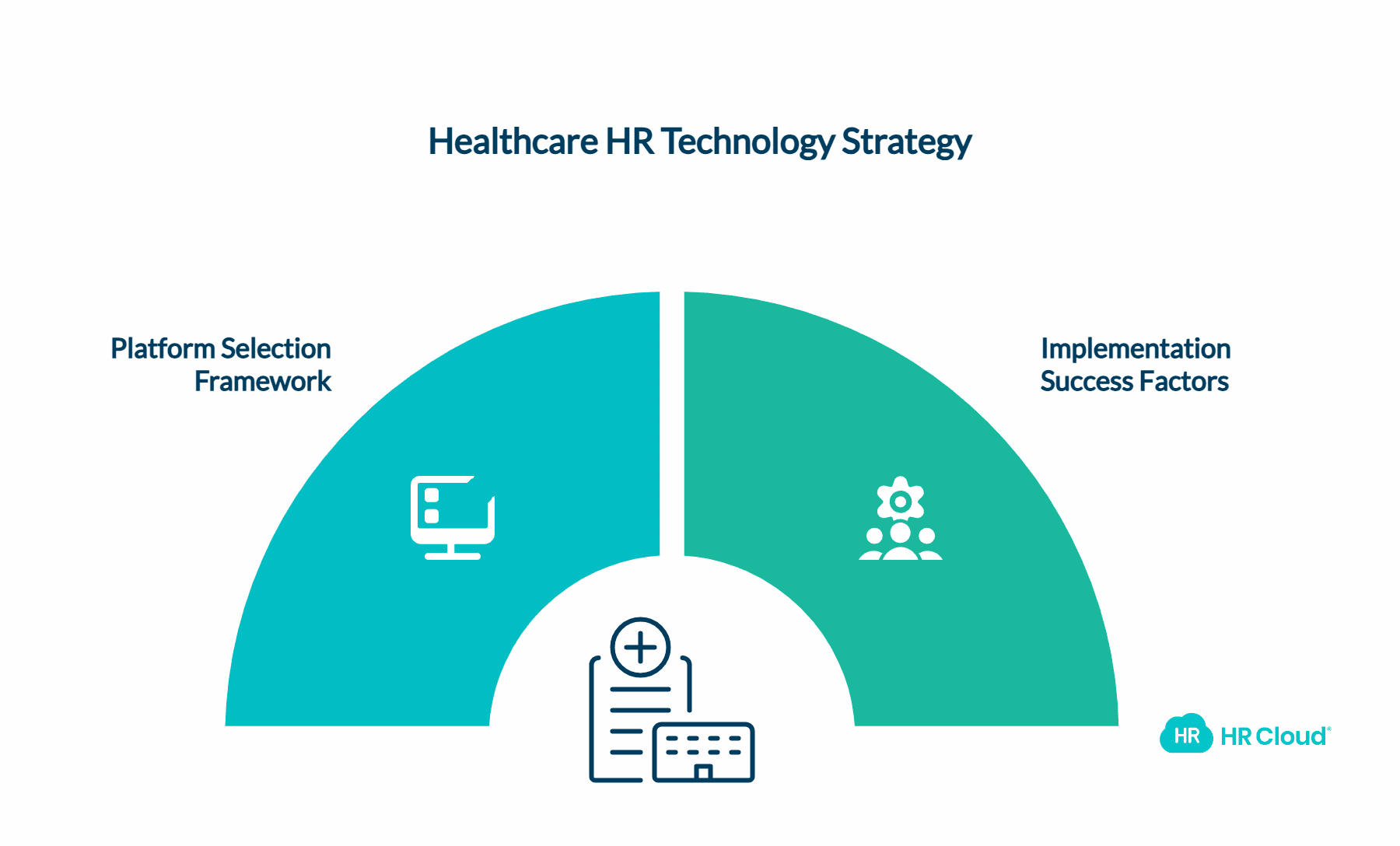
Healthcare organizations must carefully evaluate HR technology options to ensure selected platforms address current operational needs while providing flexibility for future requirements. The decision framework should consider industry-specific features, implementation complexity, and long-term scalability requirements.
Platform Selection Framework
Small healthcare practices (1-50 employees) should prioritize platforms with essential compliance features, intuitive interfaces, and rapid implementation capabilities. HR Cloud's modular approach enables these organizations to start with core features and expand capabilities as they grow without requiring system migration.
Mid-size healthcare organizations (50-500 employees) need comprehensive platforms that support complex scheduling, multiple locations, and diverse employee classifications. Advanced reporting capabilities and integration options become critical for managing larger, more complex operations.
Large health systems (500+ employees) require enterprise-scale platforms with robust integration capabilities, advanced analytics, and comprehensive compliance management. The platform must support multiple facilities, complex organizational structures, and sophisticated reporting requirements.
Implementation Success Factors
Executive leadership support proves essential for successful healthcare HR technology implementation. Leaders must champion the initiative, allocate necessary resources, and communicate the strategic importance of modernizing HR operations.
Clinical staff engagement ensures that technology adoption aligns with patient care objectives and operational workflows. Healthcare workers must understand how new systems improve their daily responsibilities and support better patient outcomes.
Ongoing optimization maximizes platform value through continuous improvement, feature utilization assessment, and process refinement. Regular system reviews help identify additional opportunities for efficiency gains and capability enhancement.
Conclusion: Transforming Healthcare HR Operations
Healthcare organizations seeking to modernize their HR operations must choose platforms specifically designed for medical industry requirements rather than attempting to adapt generic business solutions. The unique combination of regulatory compliance, operational complexity, and workforce challenges in healthcare demands specialized technology approaches that address these specific needs effectively.
HR Cloud emerges as the most comprehensive solution for healthcare organizations across all sizes and types. The platform's healthcare-specific features, rapid implementation timeline, and proven results in medical environments provide compelling advantages over competitors that struggle with industry requirements or implementation complexity.
Organizations that invest in appropriate healthcare HR technology position themselves for improved operational efficiency, enhanced compliance management, and better employee satisfaction. These benefits translate directly to improved patient care capabilities and stronger financial performance in increasingly competitive healthcare markets.
Ready to transform your healthcare HR operations with technology designed specifically for medical environments? Schedule a comprehensive healthcare consultation to explore how HR Cloud can address your organization's unique challenges and opportunities.
 Discover how our HR solutions streamline onboarding, boost employee engagement, and simplify HR management
Discover how our HR solutions streamline onboarding, boost employee engagement, and simplify HR management
Frequently Asked Questions
1. What specific healthcare compliance features should HR software include for medical facilities and hospitals?
Healthcare HR software must include automated HIPAA compliance tracking, medical license and certification management, continuing education credit monitoring, and comprehensive audit trails for regulatory inspections. Essential features include integration with state medical boards for real-time license verification, automated renewal alerts for DEA registrations and specialty certifications, and detailed documentation for Joint Commission requirements. The platform should also track mandatory training, including OSHA bloodborne pathogen protocols, emergency preparedness procedures, and facility-specific safety requirements while maintaining SOC 2 compliance for data security.
2. How does HR software designed for healthcare handle complex shift scheduling and 24/7 operations?
Specialized healthcare HR platforms support 12-hour shift patterns, rotating schedules, float pool management across departments, and emergency staffing protocols with automated notifications. The system must accommodate multiple employee classifications, including full-time staff, part-time workers, travel nurses, and contractors with different overtime rules and benefit eligibility. Advanced features include skills-based matching for specialized units like ICU and emergency departments, automated overtime calculations with consecutive shift limitations, and integration with patient census systems for acuity-based staffing decisions.
3. What are the typical implementation timelines and costs for healthcare HR software platforms?
Implementation timelines vary significantly by platform complexity and healthcare-specific requirements. HR Cloud typically completes healthcare implementations within 2-4 weeks due to its healthcare-focused design and specialized implementation team. Competitors like Paycom often require 6-12 weeks, with users reporting implementation difficulties, while enterprise platforms like ADP may require 6-12 months for full deployment. Costs include platform licensing ($8-25 per employee monthly for healthcare-specific features), implementation services, data migration, and training expenses that vary based on organization size and complexity.
4. How can healthcare HR software help reduce high turnover rates and recruitment costs in medical facilities?
Healthcare-focused HR platforms include employee engagement tools, predictive analytics for turnover risk identification, and retention program management specifically designed for medical environments. Features like shift-based communication tools, peer recognition programs, and work-life balance monitoring help address burnout and satisfaction issues common in healthcare. The platform should provide analytics that correlate staffing levels with patient satisfaction scores and quality metrics, enabling data-driven retention strategies. Given that replacing a registered nurse costs approximately $90,000 and physician replacement exceeds $500,000, even modest retention improvements provide substantial ROI.
5. What integration capabilities are essential for healthcare HR software to work with existing medical systems?
Healthcare HR platforms must integrate seamlessly with EMR systems for performance data correlation, hospital management platforms for census and acuity information, and credentialing databases including the National Practitioner Data Bank. Essential integrations include state medical boards for license verification, background check providers for healthcare-specific screening, and payroll systems that handle complex overtime calculations. The platform should also connect with employee health services for immunization tracking, occupational health monitoring, and workers' compensation management while maintaining HIPAA compliance throughout all integrations.
6. How do healthcare HR software costs compare between specialized platforms and generic business solutions?
Healthcare-specific platforms like HR Cloud typically cost $8-25 per employee monthly depending on features and organization size, while generic platforms may appear less expensive initially but require extensive customization to handle medical industry requirements. Total cost of ownership includes hidden expenses for compliance gaps, manual workarounds, and potential regulatory violations that can reach $1.5 million annually for HIPAA breaches. Specialized platforms provide better value through built-in compliance features, healthcare-specific workflows, and faster implementation timelines that reduce project costs and enable quicker benefit realization.
7. What security and data protection features are required for healthcare HR software to maintain HIPAA compliance?
Healthcare HR platforms must implement enterprise-grade security measures including data encryption at rest and in transit, role-based access controls, and comprehensive audit logging that meets HIPAA requirements. Essential features include multi-factor authentication, automatic session timeouts, and detailed activity tracking for all system access and data modifications. The platform should maintain SOC 2 compliance, regular security audits, and penetration testing while providing audit trails that document all system activities for regulatory inspections and compliance verification.
8. How can small medical practices afford comprehensive healthcare HR software without exceeding budget constraints?
Small healthcare practices can utilize modular pricing approaches that enable implementation of essential features first with expansion capabilities as needs grow and budgets allow. HR Cloud's healthcare-focused platform provides specialized medical industry features at competitive pricing with rapid implementation that reduces project costs. The ROI from automated compliance tracking, improved scheduling efficiency, and reduced administrative time often justifies the investment within 6-12 months. Additionally, avoiding compliance violations and reducing turnover costs provide financial benefits that typically exceed platform costs.
9. What mobile capabilities should healthcare HR software provide for staff working various shifts and locations?
Healthcare HR platforms must offer comprehensive mobile functionality including time tracking, schedule access, communication tools, and self-service capabilities accessible across devices during patient care responsibilities. Essential mobile features include voice-activated interactions for hands-free use, push notifications for critical staffing updates, and offline access for areas with limited connectivity. The platform should support mobile document access, digital signature capabilities, and secure messaging between shifts while maintaining HIPAA compliance and security standards throughout all mobile interactions.
10. How do leading healthcare HR platforms handle credentialing and background verification for medical staff?
Comprehensive healthcare HR platforms automate the credentialing process through integration with medical boards, certification organizations, and background check providers specializing in healthcare screening. The system should track medical education verification, malpractice insurance coverage, professional references, and ongoing competency assessments while generating reports for medical staff committees. Advanced features include automated queries to the National Practitioner Data Bank, real-time license verification, and workflow management for peer review processes and hospital privileges applications while maintaining detailed audit trails for accreditation requirements.
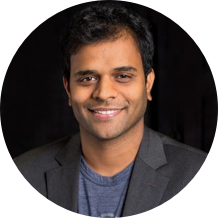
Keep Reading
Why Healthcare Organizations Choose HR Cloud Over Alternatives
What is the Best Healthcare HR Software for Medical Organizations?
The Complete Guide to Remote Work Policy Compliance: Navigating Multi-State Tax, Legal, and Security Requirements in 2026
With 22.9% of US employees working remotely as of Q1 2024—up from 19.6% the previous year
Enterprise HRIS Implementation: Rippling vs HR Cloud Integration Capabilities and Deployment Success
Enterprise HR Software Implementation Comparison
Like What You Hear?
We'd love to chat with you more about how HR Cloud® can support your business's HR needs. Book Your Free Demo

Build a Culture of Recognition. Boost Engagement. Guaranteed.
Workmates empowers employees to stay informed, connected, and appreciated—whether they’re on the front line, in the office, or remote. Recognition drives 12x higher engagement.Trusted by industry leaders in every sector




Cut Onboarding Costs by 60%.
Take the confusion and follow-ups out of onboarding with automated workflows, digital forms, and structured portals—so new hires ramp faster 3X quicker.Trusted by industry leaders in every sector




